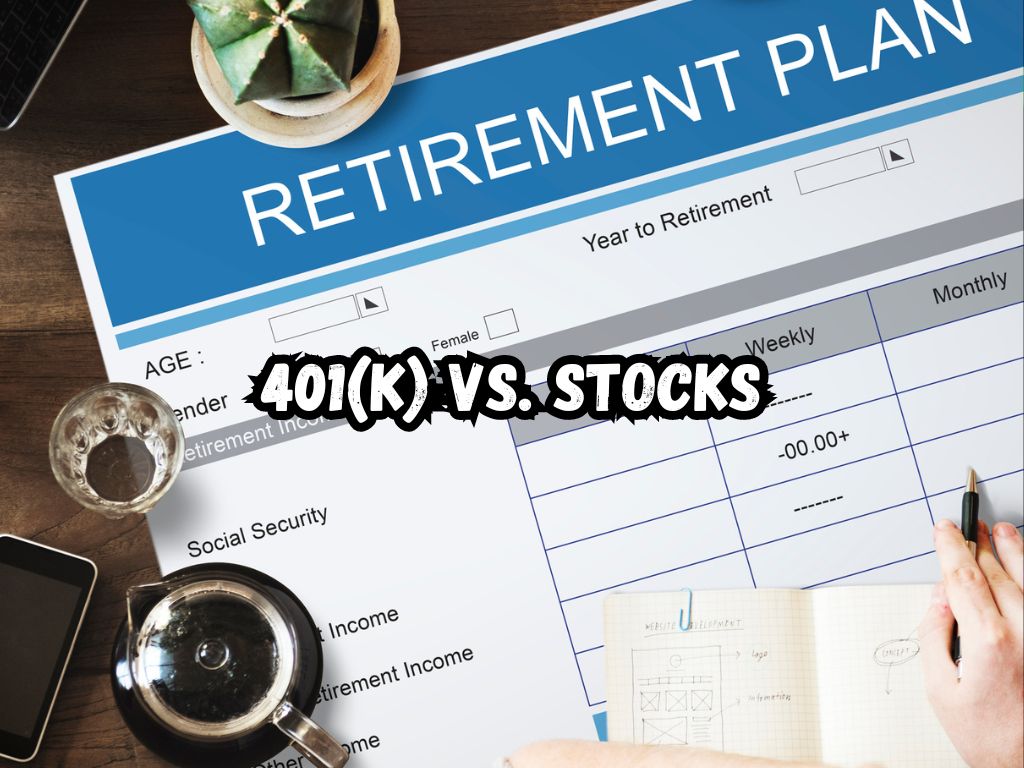Investing for retirement is a journey that requires careful planning, keen foresight, and an understanding of the various vehicles available to secure one’s financial future.
Two popular options that often come into consideration are 401(k) plans and direct investments in stocks. Each path presents unique advantages and can be instrumental in a well-rounded retirement strategy.
In this article, we examine the characteristics of 401k vs stocks, offering insights to help you make an informed decision that aligns with your financial goals.
Understanding 401(k) Plans
A 401(k) plan is an employer-sponsored retirement savings account that allows employees to save and invest a portion of their paycheck before taxes are taken out.
The traditional 401(k) plan enables contributors to defer the taxes on earnings until withdrawal, whereas the Roth 401(k) takes after-tax contributions, but allows for tax-free growth and withdrawals, subject to certain conditions.
Employers may also offer a matching contribution up to a certain percentage of the employee’s salary, an incentive that effectively amounts to free money towards retirement.
Furthermore, 401(k) plans typically offer a variety of investment options curated by the employer, including mutual funds that cover stocks, bonds, and money market investments.
While the benefits of a 401(k) include tax advantages and the potential to grow savings through compound interest, it is also important to consider the restrictions.
There are yearly contribution limits, less control over individual investment decisions compared to self-directed accounts, and potential penalties for early withdrawals that can lessen the appeal of these accounts for some investors.

Understanding Stocks
In contrast, when individuals invest in stocks, they’re purchasing shares of ownership in public companies.
This type of direct investment hands investors the reins to their portfolio’s direction, allowing them to tailor their investments to their specific preferences and risk tolerance.
The advantages of investing in stocks include the potential for high returns, especially if investors are skilled in picking winners in the stock market. Stocks also offer greater liquidity than 401(k) plans; shares can be bought and sold on any day the stock market is open.
However, the portfolio of a direct stock investor requires consistent monitoring, a robust understanding of market trends, and a willingness to ride out the market’s inherent volatility.
The risk of loss can weigh significantly more than with diversified 401(k) investments. Therefore, investing in stocks demands a more active management approach and a higher tolerance for risk.
401(k) vs Stocks: Direct Comparison
Navigating the choice between 401(k) plans and stocks depends on one’s investment strategy and goals.
For those looking at the long-term horizon, which is often the case with retirement planning, 401(k) plans offer a steady, disciplined saving method. They are an efficient way to ensure a diversified investment portfolio without the need to micromanage it constantly.
On the other hand, stocks cater to more flexibility and might be well-suited for investors who prefer a hands-on approach and have the knowledge to navigate the complexities of the stock market.
Tax considerations play a significant role in this decision. Contributions to a traditional 401(k) reduce your taxable income now, leading to immediate tax benefits, while the growth in a Roth 401(k) is tax-free.
Comparatively, investing in stocks may result in capital gains taxes but offers more control over when and how those taxes are incurred.
Analyzing potential returns from 401(k)s and individual stocks is intricate, as past performance is not indicative of future results, and each investor’s results will vary.
Historically, the stock market has provided substantial returns for investors, but individual stock picking is fraught with potential for both high gains and significant losses.
When considering retirement planning, integrating 401(k)s and stocks into a financial strategy can provide benefits.
However, it is vital to be aware of the particular rules surrounding withdrawals, as 401(k) accounts typically come with restrictions and penalties for accessing funds before the designated retirement age.

Pro Tips for Choosing Between 401(k) and Stocks
Making a decision between a 401(k) plan and stock investments is not to be taken lightly. Assess your current financial situation, your retirement timeline, and how much risk you are willing to take on.
Diversification across asset classes is a key strategy for mitigating risk and can be achieved through a combination of 401(k) investments and stocks.
Remember, maintaining a clear understanding of how taxes affect your returns can make a significant difference in your retirement savings.
This underscores the importance of adjusting your strategy as your circumstances change and as you get closer to retirement.
Frequently Asked Questions
Can I invest in stocks within my 401(k) plan?
Many 401(k) plans offer various mutual funds that invest in stocks, thereby indirectly investing in the stock market. Some plans also offer a brokerage option that allows for direct stock investments within the 401(k).
How do employer 401(k) matches work?
Employers may match a portion of your 401(k) contribution, up to a certain percentage of your income. This match is essentially free money added to your retirement savings but usually comes with a vesting schedule.
What’s the difference between traditional and Roth 401(k) plans?
Traditional 401(k) plans provide an upfront tax break, while Roth 401(k) contributions are made with after-tax dollars. Withdrawals from traditional 401(k)s are taxed as income, whereas qualified withdrawals from a Roth 401(k) are tax-free.
How should I decide between prioritizing 401(k) contributions or stock investments?
The decision often boils down to factors, such as your risk tolerance, investment knowledge, and tax considerations. A balanced approach that utilizes both 401(k) contributions and stock investments may be beneficial for some investors.
Are there any tax penalties for withdrawing investment returns from stocks before retirement?
Stock investments held for over a year qualify for long-term capital gains tax rates, which are typically lower than short-term rates. Selling stocks before a year is up could result in higher taxes.
How can I start investing in stocks or a 401(k) plan if I’m a beginner?
For 401(k) participation, consult your company’s HR department. For investing in stocks, you may consider starting with a robo-advisor or a brokerage account, and educate yourself or consult a financial advisor.
What role do risk tolerance and investment horizon play in deciding between 401(k) and stocks?
Risk tolerance and investment horizon are central to your strategy. Longer horizons and higher tolerance for risk may allow for more aggressive stock investments, while shorter horizons and lower risk tolerance may favor 401(k) contributions.
Conclusion
Deciding between a 401(k) plan and investing in stocks is a personal choice that reflects an individual’s retirement objectives, risk tolerance, and investment savvy. Both routes offer pathways to financial security in retirement, each with distinct features, benefits, and considerations.
It is wise to consult a financial advisor to navigate these choices and to tailor an investment strategy that best suits your needs.
As you look toward your financial future, empower yourself with knowledge and understand that the choices you make today can shape your financial well-being for years to come.
Whether it’s a 401(k) or stocks, or a combination of both, the most important step is to begin investing for your retirement as soon as possible.
Ensure that your retirement investment decisions are made with a full understanding of your options, and always aim to build a diversified portfolio that resonates with your individual investment style and financial goals.


 Tags:
Tags:










